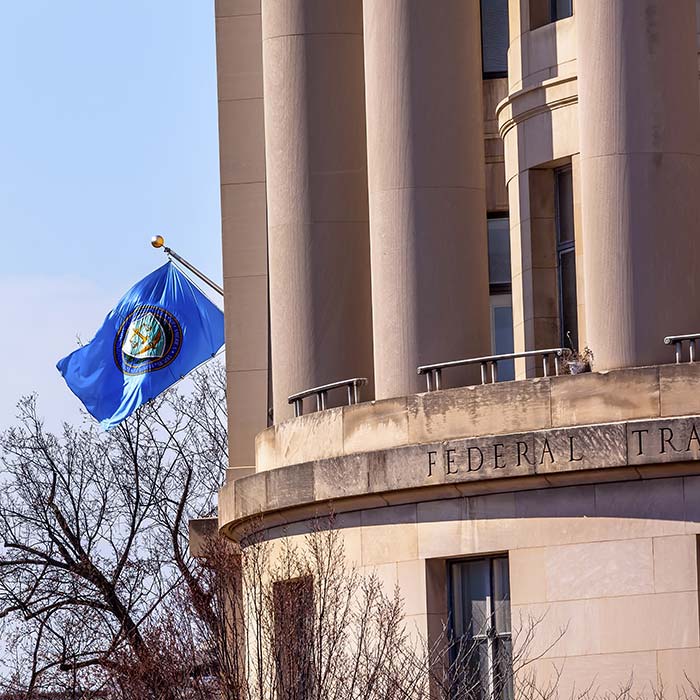
If you are an online business operator, legal compliance should be at the top of your list of priorities.
Arguably at the top of your legal priorities list should be the Federal Trade Commission (“FTC”).
The FTC is an independent agency of the United States government, established in 1914 by the Federal Trade Commission Act. The principal mission of the FTC is the promotion of consumer protection and the elimination and prevention of anticompetitive business practices, such as coercive monopoly.
The FTC has a website filled with information about the agency, its policies, tips, news, enforcement actions and more. The FTC’s website is located at ftc.gov and all internet business operators should bookmark the FTC’s website immediately.
According to the FTC’s own website one of the main things that the agency does is the Protection of Consumers:
“The FTC protects consumers by stopping unfair, deceptive or fraudulent practices in the marketplace. We conduct investigations, sue companies and people that violate the law, develop rules to ensure a vibrant marketplace, and educate consumers and businesses about their rights and responsibilities. We collect complaints about hundreds of issues from data security and deceptive advertising to identity theft and Do Not Call violations, and make them available to law enforcement agencies worldwide for follow-up. Our experienced and motivated staff uses 21st century tools to anticipate – and respond to – changes in the marketplace.” (https://www.ftc.gov/about-ftc/what-we-do)
In recent years, the FTC has become increasingly aggressive in pursuing individuals and businesses that are suspected of violating Section 5 of the FTC. For reference purposes, you can find the actual statute below. The FTC has become the lead federal agency responsible for privacy and data security practices and is often referred to as the “privacy and data police”.
The FTC has fearlessly investigated, charged, and settled with some of the largest and most successful online businesses in the world including, FaceBook, Amazon, Google, Apple, Microsoft, and Snapchat, Inc. The FTC has also gone after numerous adult websites and dating websites.
My office spends a considerable amount of its time analyzing and reviewing websites in order to provide online business operators with an idea of what they may be doing that could run afoul with the FTC and in any given week I will hear at least 4-5 clients say the same thing “but ________.com is doing the same thing; so why can’t I”. Just because someone else is engaging in an improper act and hasn’t been caught or penalized does not mean that you will share the same luck.
If you want to be a responsible online business operator, you need to spend time reading about the FTC, its authority and history of activities. You should also be making sure that you have honest conversations with your legal professionals about what products and services your website offers, so that they can properly advise you on how the FTC may affect your specific business and what you may already be doing wrong.
Our attorneys are experienced in dealing with the FTC and understanding its various powers, policies and procedures. Our attorneys can provide you with the following services:
(1) FTC compliance analysis of your online business or website(s);
(2) Responding to an informal FTC investigation;
(3) Responding to a formal FTC investigation;
(4) Responding to Civil Investigative Demand letters (“CID”);
(5) Responding to an FTC Subpoena;
(6) Representation throughout an FTC investigation;
(7) Defending against an FTC administrative complaint;
(8) Negotiating a settlement or resolution with the FTC;
(9) Review and drafting of consent orders;
(10) Order compliance and reporting issues;
(11) FTC appeals.
15 U.S. Code § 45 – Unfair methods of competition unlawful; prevention by Commission.
(a) Declaration of unlawfulness; Power to prohibit unfair practices; Inapplicability to foreign trade.
(1) Unfair methods of competition in or affecting commerce, and unfair or deceptive acts or practices in or affecting commerce, are hereby declared unlawful.
(2) The Commission is hereby empowered and directed to prevent persons, partnerships, or corporations, except banks, savings and loan institutions described in section 57a(f)(3) of this title, Federal credit unions described in section 57a(f)(4) of this title, common carriers subject to the Acts to regulate commerce, air carriers and foreign air carriers subject to part A of subtitle VII of title 49, and persons, partnerships, or corporations insofar as they are subject to the Packers and Stockyards Act, 1921, as amended [7 U.S.C. 181 et seq.], except as provided in section 406(b) of said Act [7 U.S.C. 227(b)], from using unfair methods of competition in or affecting commerce and unfair or deceptive acts or practices in or affecting commerce.
(3) This subsection shall not apply to unfair methods of competition involving commerce with foreign nations (other than import commerce) unless —
(A) Such methods of competition have a direct, substantial, and reasonably foreseeable effect —
(i) on commerce which is not commerce with foreign nations, or on import commerce with foreign nations; or
(ii) on export commerce with foreign nations, of a person engaged in such commerce in the United States; and
(B) Such effect gives rise to a claim under the provisions of this subsection, other than this paragraph.
If this subsection applies to such methods of competition only because of the operation of subparagraph (A)(ii), this subsection shall apply to such conduct only for injury to export business in the United States.
(4)
(A) For purposes of subsection (a), the term “unfair or deceptive acts or practices” includes such acts or practices involving foreign commerce that —
(i) cause or are likely to cause reasonably foreseeable injury within the United States; or
(ii) involve material conduct occurring within the United States.
(B) All remedies available to the Commission with respect to unfair and deceptive acts or practices shall be available for acts and practices described in this paragraph, including restitution to domestic or foreign victims.
(b) Proceeding by commission; Modifying and setting aside orders
Whenever the Commission shall have reason to believe that any such person, partnership, or corporation has been or is using any unfair method of competition or unfair or deceptive act or practice in or affecting commerce, and if it shall appear to the Commission that a proceeding by it in respect thereof would be to the interest of the public, it shall issue and serve upon such person, partnership, or corporation a complaint stating its charges in that respect and containing a notice of a hearing upon a day and at a place therein fixed at least thirty days after the service of said complaint. The person, partnership, or corporation so complained of shall have the right to appear at the place and time so fixed and show cause why an order should not be entered by the Commission requiring such person, partnership, or corporation to cease and desist from the violation of the law so charged in said complaint. Any person, partnership, or corporation may make application, and upon good cause shown may be allowed by the Commission to intervene and appear in said proceeding by counsel or in person. The testimony in any such proceeding shall be reduced to writing and filed in the office of the Commission. If upon such hearing the Commission shall be of the opinion that the method of competition or the act or practice in question is prohibited by this subchapter, it shall make a report in writing in which it shall state its findings as to the facts and shall issue and cause to be served on such person, partnership, or corporation an order requiring such person, partnership, or corporation to cease and desist from using such method of competition or such act or practice. Until the expiration of the time allowed for filing a petition for review, if no such petition has been duly filed within such time, or, if a petition for review has been filed within such time then until the record in the proceeding has been filed in a court of appeals of the United States, as hereinafter provided, the Commission may at any time, upon such notice and in such manner as it shall deem proper, modify or set aside, in whole or in part, any report or any order made or issued by it under this section. After the expiration of the time allowed for filing a petition for review, if no such petition has been duly filed within such time, the Commission may at any time, after notice and opportunity for hearing, reopen and alter, modify, or set aside, in whole or in part any report or order made or issued by it under this section, whenever in the opinion of the Commission conditions of fact or of law have so changed as to require such action or if the public interest shall so require, except that (1) the said person, partnership, or corporation may, within sixty days after service upon him or it of said report or order entered after such a reopening, obtain a review thereof in the appropriate court of appeals of the United States, in the manner provided in subsection (c) of this section; and (2) in the case of an order, the Commission shall reopen any such order to consider whether such order (including any affirmative relief provision contained in such order) should be altered, modified, or set aside, in whole or in part, if the person, partnership, or corporation involved files a request with the Commission which makes a satisfactory showing that changed conditions of law or fact require such order to be altered, modified, or set aside, in whole or in part. The Commission shall determine whether to alter, modify, or set aside any order of the Commission in response to a request made by a person, partnership, or corporation under paragraph [1] (2) not later than 120 days after the date of the filing of such request.
(c) Review of order; Rehearing
Any person, partnership, or corporation required by an order of the Commission to cease and desist from using any method of competition or act or practice may obtain a review of such order in the court of appeals of the United States, within any circuit where the method of competition or the act or practice in question was used or where such person, partnership, or corporation resides or carries on business, by filing in the court, within sixty days from the date of the service of such order, a written petition praying that the order of the Commission be set aside. A copy of such petition shall be forthwith transmitted by the clerk of the court to the Commission, and thereupon the Commission shall file in the court the record in the proceeding, as provided in section 2112 of title 28. Upon such filing of the petition the court shall have jurisdiction of the proceeding and of the question determined therein concurrently with the Commission until the filing of the record and shall have power to make and enter a decree affirming, modifying, or setting aside the order of the Commission, and enforcing the same to the extent that such order is affirmed and to issue such writs as are ancillary to its jurisdiction or are necessary in its judgement to prevent injury to the public or to competitors pendente lite. The findings of the Commission as to the facts, if supported by evidence, shall be conclusive. To the extent that the order of the Commission is affirmed, the court shall thereupon issue its own order commanding obedience to the terms of such order of the Commission. If either party shall apply to the court for leave to adduce additional evidence, and shall show to the satisfaction of the court that such additional evidence is material and that there were reasonable grounds for the failure to adduce such evidence in the proceeding before the Commission, the court may order such additional evidence to be taken before the Commission and to be adduced upon the hearing in such manner and upon such terms and conditions as to the court may seem proper. The Commission may modify its findings as to the facts, or make new findings, by reason of the additional evidence so taken, and it shall file such modified or new findings, which, if supported by evidence, shall be conclusive, and its recommendation, if any, for the modification or setting aside of its original order, with the return of such additional evidence. The judgment and decree of the court shall be final, except that the same shall be subject to review by the Supreme Court upon certiorari, as provided in section 1254 of title 28.
(d) Jurisdiction of court
Upon the filing of the record with it the jurisdiction of the court of appeals of the United States to affirm, enforce, modify, or set aside orders of the Commission shall be exclusive.
(e) Exemption of liability
(f) Service of complaints, orders and other processes; Return
Complaints, orders, and other processes of the Commission under this section may be served by anyone duly authorized by the Commission, either (a) by delivering a copy thereof to the person to be served, or to a member of the partnership to be served, or the president, secretary, or other executive officer or a director of the corporation to be served; or (b) by leaving a copy thereof at the residence or the principal office or place of business of such person, partnership, or corporation; or (c) by mailing a copy thereof by registered mail or by certified mail addressed to such person, partnership, or corporation at his or its residence or principal office or place of business. The verified return by the person so serving said complaint, order, or other process setting forth the manner of said service shall be proof of the same, and the return post office receipt for said complaint, order, or other process mailed by registered mail or by certified mail as aforesaid shall be proof of the service of the same.
(g) Finality of order
An order of the Commission to cease and desist shall become final —
(1) Upon the expiration of the time allowed for filing a petition for review, if no such petition has been duly filed within such time; but the Commission may thereafter modify or set aside its order to the extent provided in the last sentence of subsection (b).
(2) Except as to any order provision subject to paragraph (4), upon the sixtieth day after such order is served, if a petition for review has been duly filed; except that any such order may be stayed, in whole or in part and subject to such conditions as may be appropriate, by —
(A) the Commission;
(B) an appropriate court of appeals of the United States, if (i) a petition for review of such order is pending in such court, and (ii) an application for such a stay was previously submitted to the Commission and the Commission, within the 30-day period beginning on the date the application was received by the Commission, either denied the application or did not grant or deny the application; or
(C) the Supreme Court, if an applicable petition for certiorari is pending.
(3) For purposes of subsection (m)(1)(B) and of section 57b(a)(2) of this title, if a petition for review of the order of the Commission has been filed —
(A) upon the expiration of the time allowed for filing a petition for certiorari, if the order of the Commission has been affirmed or the petition for review has been dismissed by the court of appeals and no petition for certiorari has been duly filed;
(B) upon the denial of a petition for certiorari, if the order of the Commission has been affirmed or the petition for review has been dismissed by the court of appeals; or
(C) upon the expiration of 30 days from the date of issuance of a mandate of the Supreme Court directing that the order of the Commission be affirmed or the petition for review be dismissed.
(4) In the case of an order provision requiring a person, partnership, or corporation to divest itself of stock, other share capital, or assets, if a petition for review of such order of the Commission has been filed —
(A) upon the expiration of the time allowed for filing a petition for certiorari, if the order of the Commission has been affirmed or the petition for review has been dismissed by the court of appeals and no petition for certiorari has been duly filed;
(B) upon the denial of a petition for certiorari, if the order of the Commission has been affirmed or the petition for review has been dismissed by the court of appeals; or
(C) upon the expiration of 30 days from the date of issuance of a mandate of the Supreme Court directing that the order of the Commission be affirmed or the petition for review be dismissed.
(h) Modification or setting aside of order by supreme court
If the Supreme Court directs that the order of the Commission be modified or set aside, the order of the Commission rendered in accordance with the mandate of the Supreme Court shall become final upon the expiration of thirty days from the time it was rendered, unless within such thirty days either party has instituted proceedings to have such order corrected to accord with the mandate, in which event the order of the Commission shall become final when so corrected.
(i) Modification or setting aside of order by court of appeals
If the order of the Commission is modified or set aside by the court of appeals, and if (1) the time allowed for filing a petition for certiorari has expired and no such petition has been duly filed, or (2) the petition for certiorari has been denied, or (3) the decision of the court has been affirmed by the Supreme Court, then the order of the Commission rendered in accordance with the mandate of the court of appeals shall become final on the expiration of thirty days from the time such order of the Commission was rendered, unless within such thirty days either party has instituted proceedings to have such order corrected so that it will accord with the mandate, in which event the order of the Commission shall become final when so corrected.
(j) Rehearing upon order remand
If the Supreme Court orders a rehearing; or if the case is remanded by the court of appeals to the Commission for a rehearing, and if (1) the time allowed for filing a petition for certiorari has expired, and no such petition has been duly filed, or (2) the petition for certiorari has been denied, or (3) the decision of the court has been affirmed by the Supreme Court, then the order of the Commission rendered upon such rehearing shall become final in the same manner as though no prior order of the Commission had been rendered.
(k) “Mandate” defined
As used in this section the term “mandate”, in case a mandate has been recalled prior to the expiration of thirty days from the date of issuance thereof, means the final mandate.
(l) Penalty for violation of order; Injunctions and other appropriate equitable relief
Any person, partnership, or corporation who violates an order of the Commission after it has become final, and while such order is in effect, shall forfeit and pay to the United States a civil penalty of not more than $10,000 for each violation, which shall accrue to the United States and may be recovered in a civil action brought by the Attorney General of the United States. Each separate violation of such an order shall be a separate offense, except that in a case of a violation through continuing failure to obey or neglect to obey a final order of the Commission, each day of continuance of such failure or neglect shall be deemed a separate offense. In such actions, the United States district courts are empowered to grant mandatory injunctions and such other and further equitable relief as they deem appropriate in the enforcement of such final orders of the Commission.
(m) Civil actions for recovery of penalties for knowing violations of rules and cease and desist orders respecting unfair or deceptive acts or practices; Jurisdiction; Maximum amount of penalties; Continuing violations; De Novo determinations; Compromise or settlement procedure
(1)
(A) The Commission may commence a civil action to recover a civil penalty in a district court of the United States against any person, partnership, or corporation which violates any rule under this subchapter respecting unfair or deceptive acts or practices (other than an interpretive rule or a rule violation of which the Commission has provided is not an unfair or deceptive act or practice in violation of subsection (a)(1)) with actual knowledge or knowledge fairly implied on the basis of objective circumstances that such act is unfair or deceptive and is prohibited by such rule. In such action, such person, partnership, or corporation shall be liable for a civil penalty of not more than $10,000 for each violation.
(B) If the Commission determines in a proceeding under subsection (b) that any act or practice is unfair or deceptive, and issues a final cease and desist order, other than a consent order, with respect to such act or practice, then the Commission may commence a civil action to obtain a civil penalty in a district court of the United States against any person, partnership, or corporation which engages in such act or practice —
(i) after such cease and desist order becomes final (whether or not such person, partnership, or corporation was subject to such cease and desist order), and
(ii) with actual knowledge that such act or practice is unfair or deceptive and is unlawful under subsection (a)(1) of this section.
In such action, such person, partnership, or corporation shall be liable for a civil penalty of not more than $10,000 for each violation.
(C) In the case of a violation through continuing failure to comply with a rule or with subsection (a)(1), each day of continuance of such failure shall be treated as a separate violation, for purposes of subparagraphs (A) and (B). In determining the amount of such a civil penalty, the court shall take into account the degree of culpability, any history of prior such conduct, ability to pay, effect on ability to continue to do business, and such other matters as justice may require.
(2) If the cease and desist order establishing that the act or practice is unfair or deceptive was not issued against the defendant in a civil penalty action under paragraph (1)(B) the issues of fact in such action against such defendant shall be tried de novo. Upon request of any party to such an action against such defendant, the court shall also review the determination of law made by the Commission in the proceeding under subsection (b) that the act or practice which was the subject of such proceeding constituted an unfair or deceptive act or practice in violation of subsection (a).
(3) The Commission may compromise or settle any action for a civil penalty if such compromise or settlement is accompanied by a public statement of its reasons and is approved by the court.
(n) Standard of proof; Public policy considerations
The Commission shall have no authority under this section or section 57a of this title to declare unlawful an act or practice on the grounds that such act or practice is unfair unless the act or practice causes or is likely to cause substantial injury to consumers which is not reasonably avoidable by consumers themselves and not outweighed by countervailing benefits to consumers or to competition. In determining whether an act or practice is unfair, the Commission may consider established public policies as evidence to be considered with all other evidence. Such public policy considerations may not serve as a primary basis for such determination.
Recent Federal Trade Commission Articles
It’s Time to Take the DSA and GDPR Seriously
Adult platforms have never been more visible to regulators than they are right now. The Digital Services Act (DSA) is fully in force across the EU, GDPR enforcement keeps accelerating, and parallel “online safety” regimes in the UK and U.S. are converging on the same targets: pornography sites, creator platforms, cam networks, and tube-style aggregators. If you operate an adult website and you’re still treating DSA and GDPR compliance as a “nice-to-have,” you’re sitting on a landmine. It’s time to get serious, and enforcement against adult operators has ramped up. Featured In The January 2026 Edition Of XBIZ World The enforcement era for adult sites has arrived For years, adult platforms lived in a gray zone: enormous traffic, massive data volumes, and historically minimal oversight. That’s over. Under the DSA, porn platforms are now a named priority The European Commission has formally targeted major porn services as Very Large Online…
Eighth Circuit Vacates FTC’s “Click-to-Cancel” Rule — But the Fight Isn’t Over for Negative Option Compliance
On July 8, 2025, just days before enforcement was set to begin, the U.S. Court of Appeals for the Eighth Circuit vacated the Federal Trade Commission’s “Click-to-Cancel” Rule — officially known as the Rule Concerning Subscriptions and Other Negative Option Plans. The court’s decision came in response to consolidated petitions challenging the rule’s scope, legality, and procedural underpinnings. While the rule faced several lines of attack, the Eighth Circuit ruled decisively on procedural grounds, holding that the FTC failed to conduct the required preliminary regulatory analysis after underestimating the rule’s economic impact. Specifically, the FTC initially claimed the rule would impose less than $100 million in annual compliance costs — a critical threshold for determining whether additional economic analysis is required. Even after an administrative law judge later concluded in April 2024 that the rule would exceed that impact, the agency declined to revise its approach or provide the required…
Indemnification – You’ve All Heard the Term but What Does It Mean?
Over the course of my career as a lawyer, I couldn’t even estimate how many times a client has requested that I review a contract or assist with a contractual dispute. Time and time again, I’m told by the client that they didn’t understand or even read certain portions of the contract because it was just “standard legalese” and thus unimportant. This belief couldn’t be further from the truth and almost always leads to disastrous consequences. Featured In The February 2025 Edition Of XBIZ World "Legalese" refers to the specialized language used in legal documents, including contracts. While it can often seem daunting to those unfamiliar with legal terminology, legalese plays a crucial role in ensuring that contracts are clear, enforceable, and protect the interests of all parties involved. There are several reasons why legalese is an important part of a contract including but not limited to: Precision and Clarity:…
FTC’s “Click to Cancel Rule” and its Legal Challenge
The Federal Trade Commission's (FTC) new “Click to Cancel Rule” or the “Rule”, has been a hot topic in consumer protection and business regulation. This Rule, part of a broader effort to streamline cancellation processes for subscription services, has sparked significant debate and legal challenges, particularly from the National Cable and Telecommunications Association (“NCTA”). Adult entertainment subscription services are justifiably concerned, need to be following these developments very closely and preparing for compliance with the Rule immediately. Featured In The January 2025 Edition Of XBIZ World What is the Click to Cancel Rule? Let’s begin with the basics and some background on the Rule. The FTC recently finalized the "Click to Cancel" rule, a significant regulation aimed at simplifying the process for consumers to cancel recurring subscriptions and memberships. This Rule mandates that businesses must make it as easy to cancel a subscription as it was to sign up for…
Goodbye to Non-Compete Agreements in the United States?
A non-competition agreement, also known as a non-compete clause or covenant not to compete, is a contract between an employer and an employee, or between two companies, where one party agrees not to enter into or start a similar profession or trade in competition against the other party for a specific period of time and within a certain geographical area. These agreements are commonly used to protect a company's trade secrets, confidential information, and client relationships. They typically restrict employees from working for a competitor or starting a competing business for a certain period after leaving their current employment. The enforceability of non-compete agreements varies by jurisdiction and must adhere to certain legal standards to be valid. In fact, in some United States jurisdictions such as California, Oklahoma, North Dakota, Montana, Colorado, New Mexico and Oregon, non-compete agreements are generally unenforceable, or disfavored, with limited exceptions. The adult industry is…
Goodbye to Non-Compete Agreements in the United States?
A non-competition agreement, also known as a non-compete clause or covenant not to compete, is a contract between an employer and an employee, or between two companies, where one party agrees not to enter into or start a similar profession or trade in competition against the other party for a specific period of time and within a certain geographical area. Featured In The July 2024 Edition Of XBIZ World These agreements are commonly used to protect a company's trade secrets, confidential information, and client relationships. They typically restrict employees from working for a competitor or starting a competing business for a certain period after leaving their current employment. The enforceability of non-compete agreements varies by jurisdiction and must adhere to certain legal standards to be valid. In fact, in some United States jurisdictions such as California, Oklahoma, North Dakota, Montana, Colorado, New Mexico and Oregon, non-compete agreements are generally unenforceable,…
Adult Business Attorney, Corey D. Silverstein – 2017 Phoenix Forum Speaking Schedule Announced
On February 12, 2017, the Law Offices of Corey D. Silverstein, P.C. announced that porn lawyer, Corey D. Silverstein would be attending this year’s Phoenix Forum. It is with great excitement to report that adult industry attorney, Corey D. Silverstein, has been invited to speak at the Phoenix Forum on multiple seminars/workshops. Here is a schedule of the seminars that adult industry lawyer, Corey D. Silverstein has accepted: Business 101 panel With extensive experience and backgrounds spanning the industry, esteemed panelists offer a glimpse into what it takes to own, operate, and optimize an adult online business in today’s diverse environment. Topics include legal issues, mobile strategies, effective billing, and payment services. When: Thursday March 23, 2017 – 12:00pm – 1:00pm Where: E – Classroom Sweets with Security panel With hackers making news each month, content, passwords and login information, credit card data, all the bits of information that reside…
Say Hello to the EU-US Privacy Shield Framework
In October 2015, the European Court of Justice invalidated the International Safe Harbor Privacy Principles which were established in 2000. The Safe Harbor Privacy Principles allowed certified U.S. companies to receive personal data of EU residents in compliance with EU cross-border transfer rules. While many rejoiced the invalidation, numerous legal experts predicted that the invalidated Safe Harbor Privacy Principles would quickly be replaced. The legal experts were right. The EU-US Privacy Shield is a framework for transatlantic exchanges of personal data for commercial purposes between the European Union and the United States. After more than two years of negotiations, on July 12, 2016, the framework was adopted by the European Commission and went into effect the same day. View the full text of the EU-US Privacy Shield framework. The U.S. Department of Commerce Secretary, Penny Pritzker and EU Justice Commissioner Věra Jourová announced the deal together in Brussels. Jourová was…
Federal Trade Commission Continues to Make Its Presence Felt
Make no mistake about it, if you are an online business operator, legal compliance should be at the top of your list of priorities. For the better part of the past decade I have preached about the importance of being cognizant of the Federal Trade Commission and its various powers. Once again, the FTC is making the front page of newspapers and is a hot topic amongst journalists. On May 9, the 1st U.S. Circuit Court of Appeals released its order on John Fanning’s “Petition for Review of an Order of the Federal Trade Commission.” John Fanning petitioned the 1st Circuit to review the FTC’s summary decision finding Fanning personally liable for misrepresentations made on the website Jerk.com. While the court did find that portions of the FTC’s remedial order are overbroad, the court took the time to support the commission’s findings that Jerk.com materially misrepresented the source of its…




















